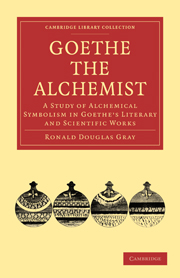II - Jacob Boehme and Alchemy
Published online by Cambridge University Press: 10 November 2010
Summary
Boehme's influence in literature and philosophy is already well known in the case of such writers as Novalis and William Blake, Hegel and Schopenhauer. Since it might appear from what follows in later chapters that his influence on Goethe was equally great, it is as well to say at the outset that Goethe mentions his name only once in all his writings, and then only in a passing reference. It is true that he probably knew of Boehme's philosophy either verbally, through his Pietist friends, or from the numerous long extracts contained in Gottfrid Arnold's work. But he never suggests that the mystic influenced or interested him in the slightest degree. On the contrary, when he was questioned concerning Baader, Boehme's interpreter, in the spring of 1814, he declared that he felt the man had something important to say, although for his own part he could not understand him. On the other hand there were, as will appear later, numerous ways in which an indirect influence might have come about.
Boehme did however systematise the symbols of the alchemists and it is for this reason that his views deserve mention here. A recent expositor writes: ‘Boehme did more than borrow a large part of his vocabulary from alchemy, he took over the whole alchemistic world-view, which he developed into a philosophic system.’
- Type
- Chapter
- Information
- Goethe the AlchemistA Study of Alchemical Symbolism in Goethe’s Literary and Scientific Works, pp. 38 - 53Publisher: Cambridge University PressPrint publication year: 2010First published in: 1952

